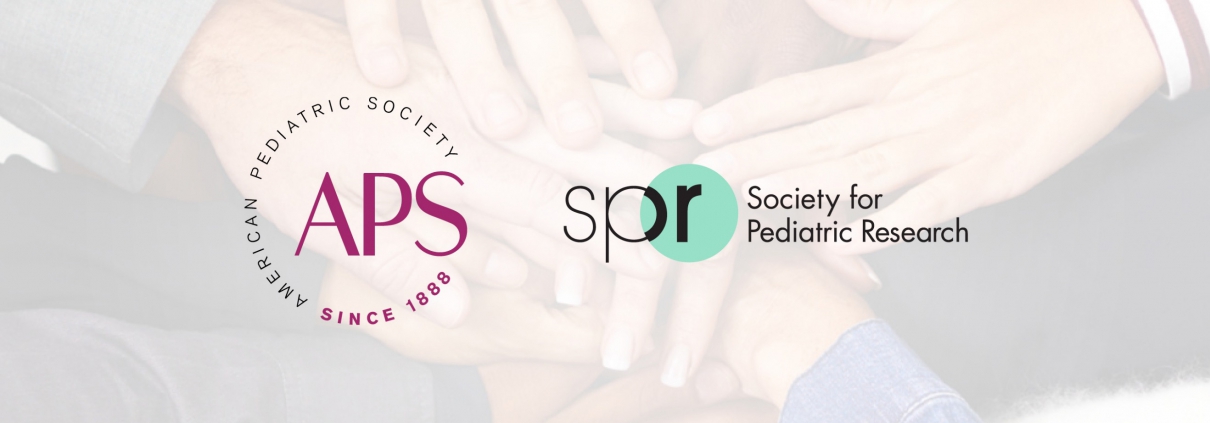Pediatric Policy Council Update
The APS and SPR are members of the Pediatric Policy Council (PPC) which actively advocates for children and academic pediatrics at the federal level. APS representatives to the PPC are Drs. DeWayne Pursley and Jonathan M. Davis; Drs. Joyce Javier and Shetal Shah represent the SPR.
The PPC also includes representatives from the Academic Pediatric Association (APA) and the Association of Medical School Pediatric Department Chairs (AMSPDC). The PPC is based in the Washington DC office of the American Academy of Pediatrics (AAP), who supplies staff and other support.
The latest advocacy developments are summarized by the PPC below
PPC CAPITOL CONNECTION
August 11, 2020
What Matters Now in Washington:
- Uncertainty over school reopening pervades as new school year nears. More…
- Congressional and White House negotiators have failed to clinch a deal on a new round of COVID relief, allowing enhanced unemployment insurance benefits to expire for millions. More…
- With the 2020 Census moving into a critical stage, advocates are worried about efforts that may undermine its accuracy. More…
- Federal officials have implemented a binary choice policy for immigrant families in federal detention centers that amounts to a new type of family separation. More…
- PPC members authored policy commentaries in Pediatric Research exploring the intersections of child health policy, advocacy, and pediatric research. More…
As New School Year Approaches, School Reopening Debate Rages On. The end of in-person learning in March marked the conclusion of the normal educational experience for students nationwide, as schools canceled in-person classes while COVID-19 spread rapidly. With the back-to-school season for a new school year fast approaching, however, there is no strong consensus on how to safely resume in-person learning.
Pediatricians have played a leading role in the school reopening debate as public officials and parents seek out child health expertise in understanding what is and is not safe for children and families. The AAP released guidance calling for policymakers to keep the goal of in-person learning top of mind given the many well documented benefits of school for young people. However, the guidance also emphasized in great detail the importance of reopening schools safely, taking into account local spread of the virus and other public health considerations. In a July 7 meeting at the White House, AAP President Sally Goza, MD, FAAP, reiterated the Academy’s stance on the importance of returning to in-person learning safely and urged the White House to provide the funding schools need to do it.
The nuance was quickly lost in the public debate, however, with advocates for a quick resumption of full in-person learning, including top Trump administration officials, citing the AAP’s guidance to call for withholding federal funds from schools that fail to reopen in full from the beginning of the academic year.
In response, the AAP issued a statement with teachers unions and school superintendents emphasizing the importance of evidence-based decision making that prioritizes the safety of students, teachers, and staff. The child health community is also calling for a $200 billion federal investment in K-12 schools to help ensure they have the resources they need to reopen safely.
—Lack of Data Is Hindering the Public’s Ability to Weigh the Risks and Benefits of Reopening. The recent emergence of the novel coronavirus is challenging public health leaders and parents to base decisions on limited data, further complicating the already fraught debate over school reopening.
From the earliest days of the pandemic, COVID-19 has appeared to present a limited risk of severe morbidity and mortality for children. However, the emergence of multisystem inflammatory syndrome in children (MIS-C) has proven that the risk is not the same for all children, and the National Institutes of Health (NIH) has begun funding research to identify risk factors in children for this severe illness. Additionally, data on the role that children play in transmitting the virus remains somewhat limited, with more recent studies suggesting an age gradient among children in their ability to transmit the virus. The Coronavirus in Kids (COVKID) Tracking and Education Project is compiling the latest data on the impact of COVID-19 on children.
All of this has important implications for the feasibility of resuming in-person learning this fall, as policymakers balance the many benefits of school against the risks to young people and the community at large. Even if children do not tend to develop severe illness from the novel coronavirus, they may be likely to bring it home to more vulnerable family members. For instance, a recent Kaiser Family Foundation analysis found that more than 3 million seniors over age 65 live with school-age children. Recent polls indicate that parents would prefer to delay the start of in-person learning or mix online learning with in-person classes to limit the spread of COVID-19. In the meantime, the value of pediatric research in reopening society is becoming increasingly clear.
COVID Relief Package Negotiations Stall as Unemployment Benefits Expire. Looming deadlines have a way of breaking political stalemates in Washington, but the conventional wisdom has not held up in the negotiations for a new COVID relief package. Republicans and Democrats in Washington have been deadlocked over how much more money to pump into the economy following record spending in several prior rounds of bipartisan legislation to mitigate the impact of the pandemic. While House Democrats advanced their vision for the next round of legislation in May, a sweeping $3 trillion bill sending money to the states and individual Americans, Senate Republicans have been slower to coalesce around a proposal.
July 31 was widely viewed as the must-pass deadline for COVID relief, with enhanced federal unemployment payments and an eviction moratorium for millions of Americans expiring. That day came and went without an agreement. Days before the deadline, Senate Republicans released a series of bills totaling around $1 trillion, but the Republican caucus remains divided over the proposal. Democrats have panned the Senate’s proposal as inadequate to meet the moment and have been steadfast in their demands that the final package look much closer to the House’s bill. Days of extensive negotiations between Democrats and the White House have yet to yield a deal, and senators have started heading home in its absence. It remains to be seen whether unilateral executive actions from President Trump to extend the moratorium on evictions, boost unemployment payments, and suspend the collection of payroll taxes will force negotiators to strike a deal.
Despite the stalemate, child health advocates continue to push for needed resources to support the pediatric health care delivery system and supports for children and families. Top priorities include an increase in the federal contribution to state Medicaid programs, changes to vaccine payment and administration to support the ongoing immunization of children, and additional financial relief for pediatric practices. Additionally, advocates are making the case for increased investments in nutrition supports, education, child care, and other social supports for families.
Census Faces Headwinds to Accurate Count. The COVID-19 pandemic has posed major operational challenges in the administration of the 2020 Census. From conducting in-person enumeration to reach households who have not yet completed the Census to compiling and analyzing the data, the work of the decennial Census is an enormous and time-consuming undertaking. The disruption to everyday life caused by the pandemic has delayed key activities necessary to conducting an accurate count.
However, the deadlines for reporting key data, including the data used for apportioning seats in the House of Representatives among the states, are set in law, and initial data is due December 31. Census Bureau officials requested that Congress extend these deadlines by 4 months, but now reporting suggests that the White House has walked back that request and will push the agency to deliver the data on the existing timeline. Census Bureau officials have now announced they plan to end Census operations by September 30, a month earlier than planned. This has raised concerns among advocates about the potential that rushing Census operations poses to conducting an accurate count, including efforts to count all children.
While the House of Representatives included a 4-month extension of the Census reporting requirements in its latest COVID relief legislation, the Senate’s proposal does not include this extension. The PPC joined other Census advocates in calling on Congress to include an extension of the statutory deadlines in the next COVID relief package, and members of the PPC organizations are encouraged to contact their senators with this critical message.
—Trump Signs Order to Exclude Undocumented Immigrants from Key Census Count. In late July, President Trump signed an executive memorandum asking the Census Bureau to use data on immigration status to exclude undocumented immigrants from Census data. Though the administration was prevented by the Supreme Court last year from including a controversial citizenship question on the Census questionnaire, the president has since been pushing the agency in charge of the decennial count to compile this information using administrative records. Based on the latest memo, the federal government is instructed to remove undocumented immigrants from Census data used to reapportion House districts among the states, which could cause some states to lose seats in the House while others gain them. The unprecedented change has already drawn numerous legal challenges from states and government watchdogs, and legal experts have described the move as unconstitutional. In addition to legal concerns, the federal government lacks a tally of undocumented immigrants, meaning there will be significant challenges to operationalizing the president’s request.
Separation of Migrant Children and Parents Returns with ‘Binary Choice’ Policy. In recent months, the Department of Homeland Security has begun implementing a so-called binary choice policy for immigrant children and families in several federal detention centers. Under the policy, parents are given the option to remain in family detention indefinitely or relinquish custody of their children either to a family member who could care for them or to the HHS Office of Refugee Resettlement to be placed in a shelter for unaccompanied children. The binary choice policy comes as COVID-19 has been shown to spread easily in detention facilities and presents a uniquely challenging choice. While a federal judge ordered children be released from federal detention facilities because of the threat of COVID-19, a different federal judge has jurisdiction over whether parents must also be released as a result of coronavirus. Litigation is ongoing to determine whether the federal government will have to release children and families together.
PPC POLICY COMMENTARIES. Members of the PPC have authored commentaries detailing the policy implications of research published in Pediatric Research. You can read these PPC-authored commentaries online:
- Shoring up the safety net for children in the COVID-19 pandemic by Tina Cheng, MD, Margaret Moon, MD, and Michael Artman, MD
- Making the case for ACEs: adverse childhood experiences, obesity, and long-term health by Joyce Javier, MD, Lucas Hoffman, MD, and Shetal Shah, MD

